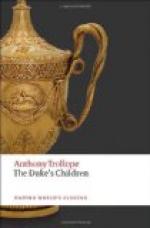‘What do you advise then?’
’That you should yield. As regards money, you could give them what they want. Let him go into public life. You could manage that for him.’
‘He is Conservative!’
’What does that matter when the question is one of your daughter’s happiness? Everybody tells me that he is clever and well conducted.’
He betrayed nothing by his face as this was said to him. But as he got into the carriage he was a miserable man. It is very well to tell a man that he should yield, but there is nothing so wretched to a man as yielding. Young people and women have to yield,—bur for such a man as this, to yield is in itself a misery. In this matter the Duke was quite certain of the propriety of his judgement. To yield would be not only to mortify himself; but to do wrong at the same time. He had convinced himself that the Popplecourt arrangement would come to nothing. Nor had he or Lady Cantrip combined been able to exercise over her the sort of power to which Lady Glencora had been subjected. If he had persevered,— and he was still sure, almost sure, that he would persevere,—his object must be achieved after a different fashion. There must be infinite suffering,—suffering both to him and to her. Could she have been made to consent to marry someone else, terrible as the rupture might have been, she would have reconciled herself at last to her new life. So it had been with Glencora,—after a time. Now the misery must go on from day to day beneath his eyes, with the knowledge on his part that he was crushing all the joy out of her young life, and the conviction on her part that she was being treated with continued cruelty by her father! It was a terrible prospect! But if it was manifestly his duty to act after this fashion, must he not do his duty?
If he were to find that by persevering in this course he would doom her to death, or perchance to madness,—what then? If it were right, he must still do it. He must still do it, if the weakness incident to his human nature did not rob him of the necessary firmness. If every foolish girl were indulged, all restraint would be lost, and there would be an end to those rules as to birth and position by which he thought his world was kept straight. And then, mixed with all this, was his feeling of the young man’s arrogance in looking for such a match. Here was a man without a shilling, whose manifest duty was to go to work so that he might earn his bread, who instead of doing so, he hoped to raise himself to wealth and position by entrapping the heart of an unwary girl! There was something to the Duke’s thinking base in this, and much more base because the unwary girl was his own daughter. That such a man as Tregear should make an attack upon him and select his rank, his wealth, and his child as the stepping-stones by which he intended to rise! What could be so mean as that a man should seek to live by looking out for a wife with money? But what so impudent, so arrogant, so unblushingly disregardful of propriety, as that he should endeavour to select his victim from such a family as the Pallisers, and that he should lay his impious hand on the very daughter of the Duke of Omnium?




